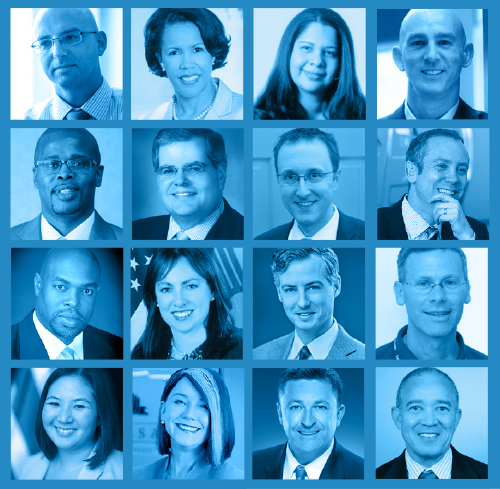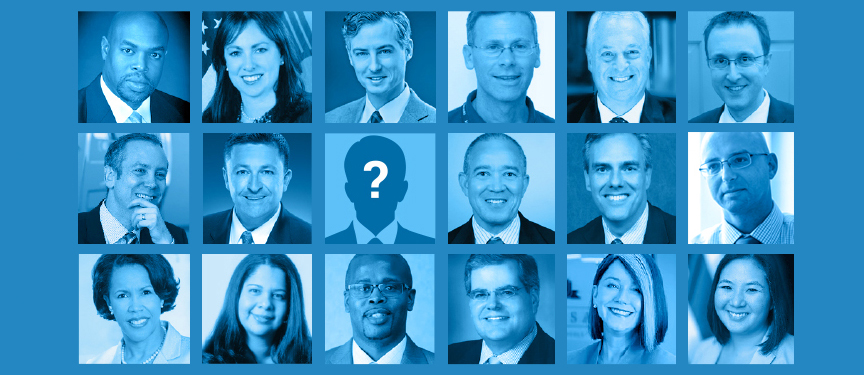
SUBSCRIBE
TO MONTHLY UPDATES
We'll send you information that
will keep you up to date on CFC

WASHINGTON, DC — Chiefs for Change today announced its third cohort of Future Chiefs – bold and innovative state and district education leaders who are transforming our nation’s schools and are preparing for even larger roles in our education system.
These leaders will be celebrated during the Future Chiefs Cohort 3 launch event being held in Washington, DC on April 4th, 2018 at 4pm in collaboration with the Fordham Institute. Speakers and panelists will make the case for why Washington should stop obsessing about policy and start a new conversation about the importance of bold, diverse, and sustained leadership that leads to real action and better outcomes for our students.
Clear vision, strong preparation and diversity matter in establishing excellence for students and closing long-standing gaps. Yet few pathways exist to identify and prepare qualified candidates for these roles; rapid turnover and changes of vision are a consequence. And while more than half of U.S. students are students of color, education Chiefs are far from reflecting that diversity.
To fix that, Chiefs for Change is helping to build a diverse pipeline of Future Chiefs by identifying bold and innovative state and district education leaders. The first and second cohorts were each comprised of eight leaders, half of whom have since been promoted or stepped up into Chief roles. The nine leaders selected for Cohort 3 will participate in a year-long program of coaching and mentorship from leading chiefs nationally, and collective learning on issues that are central to effective leadership. Diversity, equity, and inclusion are core to the Future Chiefs program — Cohort 3 is made up of 89% leaders of color.
“We know the leadership of our nation’s major school systems matters a great deal for millions of kids. Yet each time a superintendent or state chief steps down, we engage in a haphazard scramble to replace them,” said Chiefs for Change CEO Mike Magee. “The Future Chiefs program turns this paradigm on its head by developing pipelines of well-prepared and diverse leaders ready to step into education Chief roles as they open up.”
Bill Hite, Superintendent of the School District of Philadelphia, said: “I look forward to working with this diverse group of leaders to explore solutions to the challenges facing our students and to effect meaningful change on a national scale. I’m excited about each of these talented leaders, including Penny Nixon, and the bold and innovative work they will continue to do for our kids.”
“I’m proud to support the Future Chiefs program, because students benefit when the adults leading their schools and school systems look like and have shared experience with them,” said Deborah McGriff, Managing Partner of NewSchools Venture Fund (NSVF). “The Future Chiefs in this newest cohort are bold, diverse leaders committed to expanding equity and opportunity across our nation’s schools, and I’m confident we’ll continue to see great things from them.” NewSchools Venture Fund supports the Future Chiefs program as one of the investments in its Diverse Leaders portfolio.
The nine leaders selected to be part of Future Chiefs Cohort 3 are:
Chiefs for Change members and Future Chiefs from across the country praised the Future Chiefs program and expressed support for Cohort 3:
Susana Cordova, Future Chiefs alumni and Deputy Superintendent of Denver Public Schools, said: “Being a part of Future Chiefs has been an extremely rewarding experience. I have been afforded the opportunity to build a relationship with like-minded leaders who are focused on successful outcomes for our kids. I look forward to making a bigger impact on kids’ lives with the skills I have developed.”
Robert Avossa, Superintendent of Palm Beach County Public Schools, said: “The cohort experience provided during the Future Chiefs program is an exceptional opportunity where diverse leaders can convene together to solve the issues of access and equity for our kids. I’m thrilled to support these transformational leaders.”
David Hardy, Future Chiefs alumni and CEO of Lorain City Schools, said: “The individualized support I have received from Future Chiefs has been unparalleled. I’m excited to welcome Future Chiefs Cohort 3 to this great program and network of exceptional leaders.”
Barbara Jenkins, Superintendent of Orange County Public Schools, said: “Developing the next generation of leaders is vital to accelerating the progress of urban school districts across the country. I am pleased that Dr. Jara will now add the Future Chiefs experience to his extensive preparation.”
Tommy Chang, Superintendent of Boston Public Schools, said: “I am a firm believer in the need for a collaborative, team-based approach to the huge challenges facing urban districts. Chiefs for Change and Future Chiefs offer leaders across the country, committed to excellence and equity for all children, an opportunity to collaborate and strategize solutions and pathways for success. I am excited to welcome two amazing educators, one whom I work with currently and another whom I used to work with, to this network of leaders.”
Christopher D. Cerf, Former Superintendent of Newark Public Schools, said: “I’ve run both a state or local school system, and know that the work is challenging. I also know that the future of public education depends on the vision and effectiveness of the next generation of leaders. When I look at leaders in this group of Future Chiefs, like Robert Gregory, I see committed and talented educators who are up to the task of balancing policy and politics so that children can win.”
Mark Murphy, Former Delaware Secretary of Education, said: “Dr. Schwinn and the other leaders in this cohort have the skills, the drive, and the passion to effectively lead systems towards better outcomes for kids. The Future Chiefs program will continue to unleash and lift up the incredible potential of these leaders — and hopefully will provide even greater opportunities to continue serving students.”
Chiefs for Change members, Future Chiefs, and other leaders in the field will come together next month for a launch event that addresses the central question, “Should Washington stop obsessing about policy, and start obsessing about leadership?” To attend the event, RSVP here.